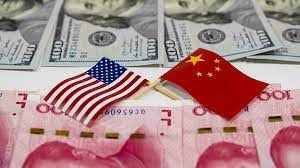Recent developments in the United States of America- China relations are giving keen watchers of events between nations some cause to worry. The reported near misses by their respective military vessels are such that many think should not be allowed to continue before a mistake occurs. In a matter of weeks, two near misses were reported between a US reconnaissance plane and a Chinese fighter jet. A report claimed that the two aircrafts came too close for comfort. The jitters arising from that incident had hardly died down when it was reported again that warships belonging to the two countries almost had a nose brush at sea.
We recall that before these unfortunate incidents, the United States had shut down a balloon belonging to China which it had reasons to assume was a spy craft. China was not amused just as it denied the categorization of that craft.
Before now, the issues bugging the relations between the two countries were majorly economic. It must be pointed that the two countries are the world’s largest economies by nominal Gross Domestic Product (GDP) and purchasing power parity (PPP). Collectively, they make up 44.2 per cent of the world GDP by nominal and 34.7 per cent by PPP. Understandably, therefore, the competition among them is fierce resulting, often, in trade disputes and sanctions.
Outside the economic sphere, both countries have a hegemonic great power rivalry throughout the Asia-Pacific region and beyond. While they have mutual political, economic, and security interests, there are also unresolved concerns, with differentiating views such as on the political status of Taiwan or territorial disputes in the South China Sea. China insists that Taiwan is part of its territory and has vowed to bring that island nation back to mainland China, by force, if necessary. US thinks otherwise and has continued to provide diplomatic and military cover for that beleaguered country. The Russia- Ukraine war has added a dangerous mix to a relationship that is beginning to seem to be a re-enactment of the cold war between the Soviet bloc led by Russia and the North Atlantic Treaty Organisation (NATO) allies led by the United States of America.
Just before the onset of the Ukraine war, Russia and China had entered into an agreement in their relations which they affirmed was “without limits”. On the basis of that, China has shied away from condemning Russia for the devastation it is causing, needlessly, in Ukraine. That is in spite of pressures from the US. Perhaps, to express its misgivings, top United States politicians, in particular, the former Speaker of the House of Representatives, Nancy Pelosi, the third in the US perking order, had paid a high-level visit to Taiwan, a development China considers as a violation of the One-China policy agreed to with the US.
It will be recalled that it took a visit by President Richard Nixon to China in 1972 to reverse an earlier position in which the United States blocked China’s membership of the United Nations. Actually, it was as early as January 1, 1979, that the US established diplomatic relations with the Peoples Republic of China and recognized it as the sole legitimate government of that country. Before this, Taiwan was the recognized China. But even with this development, US continued unofficial warm relations with Taiwan within the framework of the Taiwan Relations Act. It is no surprise, then, that the political status of Taiwan, a country of 23.57 million people by 2020 estimates, has continued to be a major source of contention.
Analysts aver that relations between the two countries worsened under the presidency of Donald Trump. Two Chinese policies may have irked the Trump administration and created the framework for the downward spiral in their affairs. The first was the perceived militarization of the South China Sea by Beijing. The second was the alleged Chinese espionage in the United States.
The Trump administration labeled China a “strategic competitor” and launched a trade war against that Asian country. The U.S. banned American companies from selling equipment to Huawei and other companies linked to human rights abuses in Xinjiang; revoked preferential treatment towards Hong Kong after the Chinese government passed a wide-ranging national security law in the city; increased visa restrictions to students from China and upgraded relations with Taiwan.
In response, China adopted what it described as “wolf warrior diplomacy” to deny all accusations of human rights abuses. The defeat of Trump and the emergence of Joe Biden did not improve relations between the two world powers. On the contrary, in our opinion, Biden, by his policies seem to have adopted confrontation and competition with China as a priority foreign policy thrust. The US president went further to impose large-scale restrictions on the sale of semiconductor technology to China, boosted regional alliances against China, and expanded support to Taiwan.
As a newspaper, we are compelled to recall the impact of the cold war between the Union of Soviet Socialist Republics (USSR) and the Allied Powers that dragged for decades. Developing nations like Nigeria were caught in the middle. Even Professor Bolaji Akinyemi’s ‘concert of medium powers’ was unhelpful. As noted earlier in this editorial, both countries control 44.2 per cent of world economy by GDP. Any conflict involving them will be internationally catastrophic. Worse, with Ukraine fighting a proxy war for the West with Russia, the world cannot afford another unrest in Asia involving the two most powerful nations in the world. This, in our view, is one reason the exercises in South China Sea and the Taiwan airspace must be seen as playing with fire and stopped forthwith before they ignite a conflagration.





